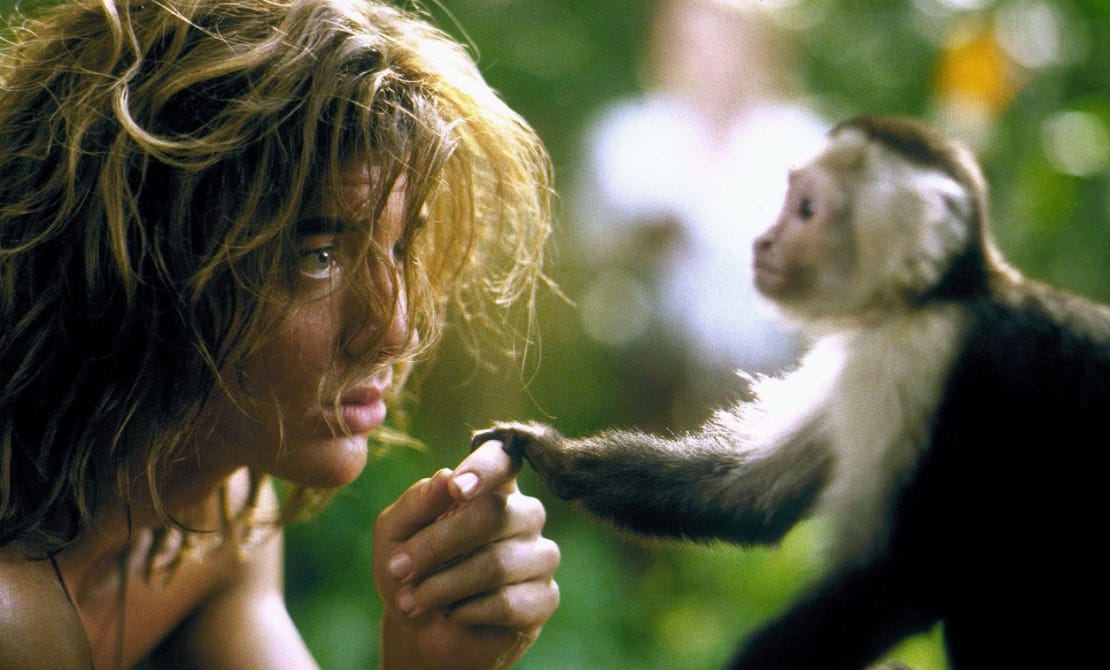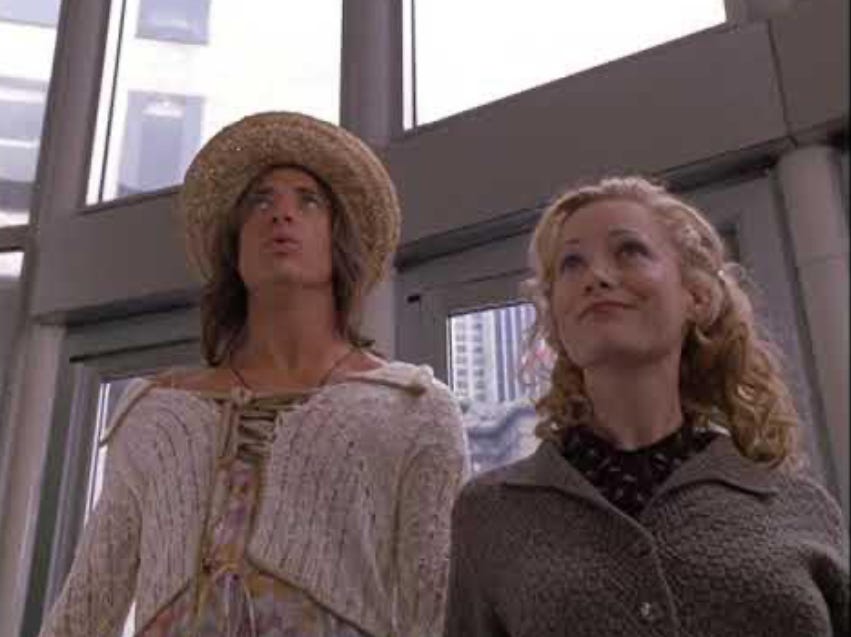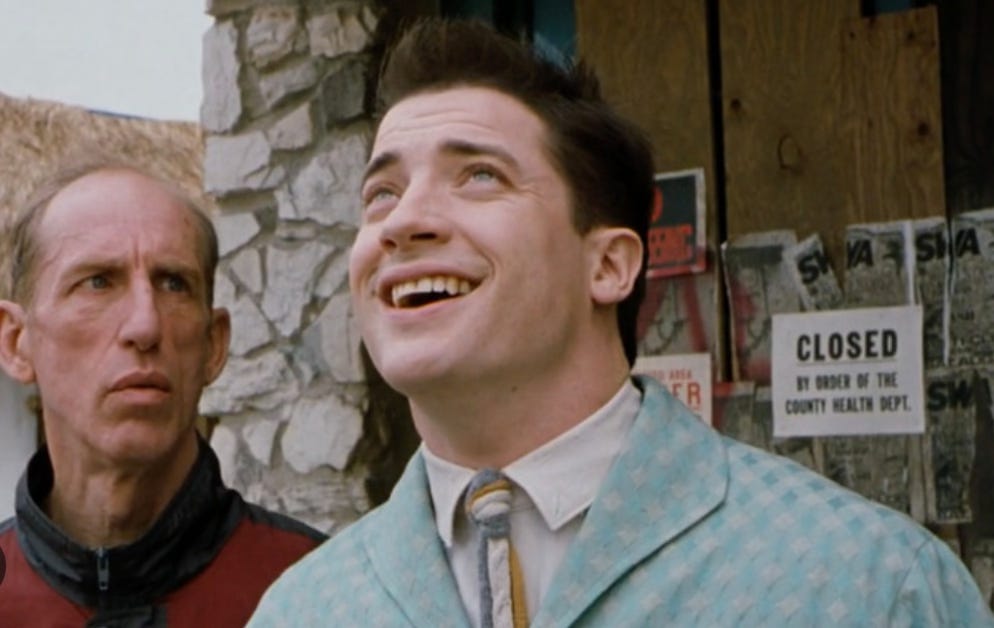Blast from the Jungle
Two fish out of water tales brought to you by the, ever delightful, Brendan Fraser!
Welcome to AutCasts, a free bi-weeekly newsletter by writer, Aisling Walsh, exploring neurodivergence through cinema’s oddballs, misfits & rebels!
Brendan Fraser sealed his place in the history of Hollywood heartthrobs playing the sexy and roguish (but also sweet) treasure hunter, Rick O’Connell in the 1999 remake of The Mummy. As. much as I was a fan of the blockbuster that spawned a 18 year franchise, there are two other Fraser gems from the late 90s that captured my tweeny heart even more: George of the Jungle (1997) and Blast from the Past (1999).
If the former established Fraser as all-round hottie, the latter allowed him to keep his clothes on and show off his sweeter side. I’ve decided to feature the two movies together, in an epic I’m calling ‘Blast from the Jungle,’ because these are both perfect fish out of water tales where Fraser is saved by two gorgeous blonds, that spoke to make of my neurodivergent sensibilities!
In George of the Jungle, directed by Sam Weisman, a plane crash leaves George (Brendan Fraser) orphaned in the jungle under the care of his adoptive father, Ape (voiced by John Cleese). Cut off from the rest of the world, George grows up in almost complete ignorance of human civilisation until ‘discovered’ by a two American tourists on safari in Burundi. He “saves” Ursula (Leslie Mann) from a man-eating lion and brings her to his home where they are found a couple of days later by Ursula’s boyfriend all-round jerk Lyle (Thomas Haden Church). George gets shot and is rushed to hospital in San Francisco. As George becomes acquainted with the rest of his species and the complexities of the human world at the end of the twentieth century hilarity ensues.
In Blast from the Past, a plane crashes into Adam’s (Brendan Fraser) family home in the midst of the Cuban Misile crises and Adam’s parents rush to shelter in their nuclear bunker. This saves them from the blast, but means they are trapped underground thinking they are the only survivors of a nuclear holocaust. When the doors of the bunker open 35 years later Adam, who has been cut off from the rest of the world and living in a 1960s time capsule, is confronted by the fin de siècle decay of down town LA circa 1999. The shock of the modern world means he is immediately overwhelmed by the unfamiliarity and sensory overload and he soon finds himself both lost and clueless. He is saved from a scammers by Eve (Alicia Silverstone) who he employs to help him navigate the world, buy supplies for the bomb shelter, get him a wife and find his way back home.
Tween dreams…
I potentially saw both these movies in the cinema but I have lost any sense of a first impression, having rented the VHS multiple times from the local Xtra Vision (Ireland’s answer to Blockbuster). George of the Jungle (GOTJ) was a regular feature at weekend visitations to my father’s house where activities mostly included rewatching old movies or staring at the cows in a neighbouring field. At 12, I was just young enough to still enjoy the nods to its cartoon origins and the touch of slapstick and just old enough to fully appreciate the spectacle of George’s abs.
Blast from the Past (BFTP) was, perhaps, the most underrated comedy of 1999 and it clearly suffered by proximity to its star’s other hit of the summer, The Mummy, the sixth highest grossing movie of the year. But, BFTP also had to compete with the likes of 10 Things I Hate About You, The Matrix, Fight Club, The Virgin Suicides, Magnolia, The Sixth Sense and many, many, more instant classics released that year. It’s hardly surprising that this low-key oddball comedy passed under most people’s radar despite its star-studded cast. Nevertheless, Adam and Eve’s unlikely romance became a regular at sleepovers with my secondary school friends and a movie I would watch on repeat throughout my teens.
No only did I have a massive crush on Fraser (as well as Rachel Weiss, Alicia Silverstone and Leslie Mann if I’m being honest) but GOTJ and BFTP both spoke deeply to my growing bewilderment with the world around me and its expectations as I transitioned from child to tween. George/Adam’s emergence from the jungle/bomb shelter and their confounding, and sometimes harsh, encounters with the outside world were a mirror to my own inability, and sometimes refusal, to conform to social norms and expectations which never quite made sense to me.
You have nice ceilings!
On leaving the bomb-shelter for the first time Adam is confronted with a world that is so unrecognisable to the 1960’s idyl he grew up in that he really does believe there has been a nuclear disaster and the survivors left on earth have been irreversibly altered. He lacks basic skills like negotiating public transport and managing money while his overly formal, overly friendly speech and manners clash with a distrusting public who seem to have lost the habit of polite human interaction.
The world is too bright, brusque and full of confusing encounters and new rules that Adam has not been exposed to. He is immediately lost in the LA urban sprawl and his panic mounts as he stares out the bus window, watching the daylight fade while unable to recognise anything. His innocence and willingness to trust perfect strangers makes him extremely vulnerable to getting scammed or exploited.
George’s encounter with the world beyond the jungle is guided, for the most part, by Ursula who is keen to show him all he has “missed out on” during his years lost in the jungle. But modern-day San Francisco might as well be an alien landscape, where the laws of the jungle continue to be his principal frame of reference.
One of the more interesting juxtapositions in these two movies is how George and Adam’s relationship to speech becomes a signifier of the ways in which they have been cut off from the world. Adam uses overly formal, antiquated speech patterns leftover from the 60s. George, on the other hand, displays a rudimentary, almost childlike understanding of English even as he has grown up with the linguistically exceptional Ape. Despite his increasing contact with the outside world, George retains his child-like use of English throughout. Both these forms of communication make sense in their original contexts but when confronted with the outside world lead to unending confusions and misinterpretations on all sides (not least Adam’s misunderstanding that ‘gay’ means ‘happy’).
Adam and George also show many non-verbal forms of communication, with George, in particular relying, on very corporeal (sometimes intentionally animalistic) ways of expressing his feelings. For a children’s movie based on an inherently racist colonial tale, you could argue that George’s failure to distinguish between humans and other animals, ignoring the supposed hierarchy of “man” over all other beasts, is a surprisingly progressive interpretation of the kind of multispecies entanglement and response-ability, argued for by scholars such as Donna Haraway.1
Apologies for the academic digression!
Returning to the issue of communication, this is a constant focus of supposed “deficits” for neurodivergent people. Speech patterns or lack of speech are a subject of intense scrutiny within the current diagnostic framework, where anything from non-verbality or rudimentary speech, to overly formal speech can be considered diagnostic “symptoms” or deficits that require treatment or intervention rather than accommodation. My tendency is towards overly formal, sometimes archaic, speech (see the previous two paragraphs for proof) but I also have moments where I have lost some or all of my words! When speech patterns or lack of speech are included in a diagnostic criteria for identifying a “disorder” the implication, of course, is that autistic forms of expression and communication are somehow disordered or pathological, rather than simply a reflection of the diversity of human expression. Mel Baggs (RIPower) was a non-verbal autistic blogger who advocated for the acceptance of diverse forms of communication and use of language beyond speech. I highly recommend this video for an insight into Mel’s rich world of language:
The thing I love most about GOTJ and BFTP is that despite the confusion their speech causes at times, or that the misunderstandings are a source of much of the comedy, the movies are always rooting for Adam and George. In fact, these communication confusions often serve to show up the judgemental, discriminatory, racist or misogynistic traits of the supposed “normie” characters. In doing so, both movies celebrate, rather than pathologise, George and Adam’s communication styles.
I know a duck who bought some lip balm…
GOTJ and BFTP are, essentially, fish out of water tales. This trope probably accounts for at least half the movies covered in this newsletter. As a neurodivergent person this trope has a particular appeal as it allows viewers to poke gentle fun at the absurdity of many human conventions and social rules as seen from the eyes of the outsider. This allows us a rare insight into neurotypical conventions and the outsider is allowed to teach those who, in theory, belong that there are other ways of being and doing in the world, a privilege rarely granted to neurodivergent people. In George’s case, the freedom and alternative lifestyle he has enjoyed in the jungle is considered a prospect so attractive that Ursula is willing to give up her high society life to join George in the jungle.
George and Adam have unconventional childhoods that set them apart from their contemporaries in ways that both hinder and support their development as individuals and their social skills. Their direct way of relating with others, which could provoke social rejection, actually wins people over because they come across as surprising, funny or novel. Their innocence contrasts with the cynicism and jadedness of those who have been living among so-called “civilisation” and their joy begins to wear down the armour of the people who surround them.
One of the most refreshing ways in which George and Adam are celebrated as outsiders is their gender bending. In George’s case this literally means going in drag as he makes his runway debut on the streets of San Francisco in a delightful summer dress complete with cardi and straw hat. But beyond gendered clothing conventions, both George and Adam demonstrate moments of vulnerability and engage in multiple acts of care for the people and animals who surround them throughout the movies, while still remaining the heroes of their narratives. It’s far too unusual to see a cis man on screen (or in real life, for that matter) performing acts of care that are not born out of pure self-interest or obligation!
The fact that the cinema going public continues to lap up fish out of water tales of all kinds suggests, to me at least, that it’s not just neurodivergent people who enjoy poking fun at social conventions. Perhaps even neurotypical people who seem, at least on the surface, to be more accepting of society’s unwritten rules, also enjoy these opportunities to question, or even make fun of social norms?
The sky, I've never seen anything like it!
To wrap up for the week I would just like to give a nod to the moments of pure sensory joy that George and Adam display on multiple occasions as they encounter, the sea, the sky, coffee or donuts for the first time. Even though this makes the people around them uncomfortable or bemused at times, the “normies” eventually come to realise they, rather than George or Adam, have lost their ability to feel joy or express wonder at the world around them.
At the end of the day it is refreshing to see two oddballs with the confidence (or perhaps obliviousness) to be themselves all the time even when they encounter open ridicule or disdain. And if that, my friends, is not the eternal dilemma of living as a neurodivergent in a neurotypical world, than I don’t know what is!
Also a special shout-out to cinema favourites of mine, Sissy Spacek and Christopher Walken, who make a delightful pair of neurodivergent parents. Walken is a single-minded genius, ridiculed by his colleagues despite his brilliance, who thrives in the controlled environment of the bomb-shelter. Walken’s passion for science is match by Spacek’s passion for cooking, but Adam’s mother also craves novelty and an escape from the bomb-shelter.
Thank you for reading AutCasts! If you liked what you read, please tap the heart 💕 below and consider subscribing (for free) or sharing this essay. As an independent writer it’s the best way to support my work!
Things I’ve been reading lately:
The great
wrote a guest post for one of my favourite newsletters, by about the skills regression that can occur after an autism diagnosis when you are essentially ‘re-learning’ how to do things while unmasked.In-keeping with the general theme of this newsletter,
from wrote a beautiful exploration of the Disney classic Fantasia (incidentally the only movie that has ever scared me out of the movie theatre) and its resonances with the neurodivergent experience, particularly late-diagnosed ADHD.For the writer’s among you, I loved this piece from Rebecca Stafford writing on
’s newsletter about the painful, but necessary, process of overhauling a novel draft that is simply not working. She describes how - in between the first and second drafts - she sought out an ADHD diagnosis and developed writing practices and habits that worked with, rather than against her neurodivergence.Previous AutStack collaborator,
, put together an incredible resource on how to find a therapist that works for you, include advice on how and why it is worth “auditioning” therapists before you make a commitment. Though Clare’s focus is on finding someone who is trauma-informed, the same advice could easily apply to finding a neurodivergent-affirming therapist.
That’s it from me for this week. I’ll be back next time with a round-up of my favourite neurodivergent memoirs. In the meantime why not tell me about your favourite fish out of water tales or even your favourite Brendan Fraser movie?
I’m not a fan of Disney’s history of reaffirming tired colonial narratives and racist tropes, but GOTJ is partly saved by the fact that Lyle (a sort of proto-Venture capitalist) is the film’s bad guy from the get-go and his safari guides are given multiple opportunities to ridicule him.






Thank you for the shout out 🙏
Thank you Aisling, fun and on point!! Love your points on the vagaries of communication and that both situations and characters highlight how beauty and wonder are available every day and can be overlooked so easy in the hum-drum of life. I enjoy your blogs a lot and always get some nice take-aways from them. 😍🙏